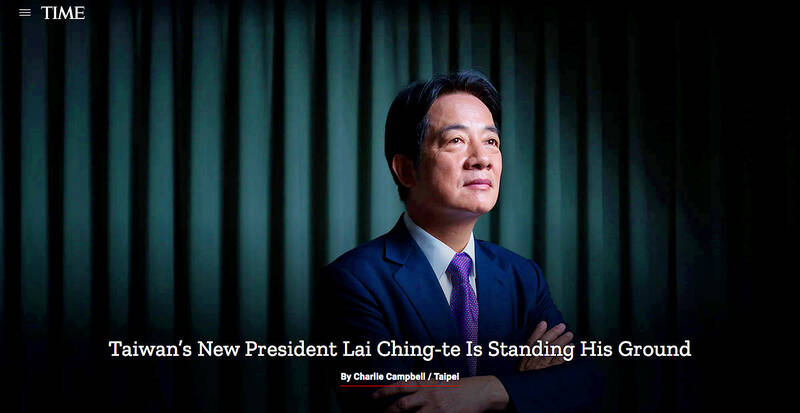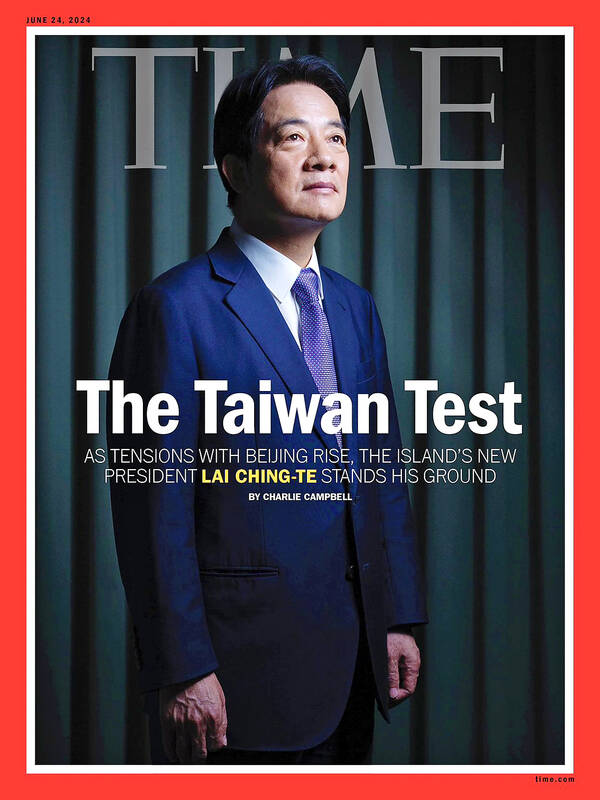A prosperous Taiwan can bring about progress in China, and Taipei seeks peace and prosperity across the Taiwan Strait, President William Lai (賴清德) told Time magazine in an exclusive interview published yesterday, his first since becoming president.
Taiwan wishes for a stable and prosperous China, as it would help maintain peace and stability in the region, he said.
“I have always believed that a stable China leads to a safer Taiwan. A prosperous Taiwan can also bring about progress in China,” he was quoted as saying, while asked if China’s problematic economy could be an opportunity for further engagement across strait. “I do not wish to see growing difficulties in China’s economy or its society become more unstable.”

Photo: screen grab from the “Time” Web site
The new government under his administration “is willing to assist China and advance peace and prosperity across the Taiwan Strait,” Lai said.
Asked to comment on China’s courting of the global south to get diplomatic support for its so-called “reunification” of Taiwan, Lai called on all nations to “respect the choice of the Taiwanese people.”
The will of Taiwanese “should not be subject to decisions made by a majority or show of hands” in the international arena, he said, before expressing the hope that the global community would “assist, understand and support” Taiwan.

Photo: screen grab from the “Time” Web site
Regarding Beijing’s continued refusal to engage with Taipei, Lai said he would continue to uphold former president Tsai Ing-wen’s (蔡英文) “four commitments.”
The term refers to Taiwan’s commitment to a democratic constitutional system, not being subordinate to China, protecting national sovereignty and the right of Taiwanese alone to determine their future.
Chinese President Xi Jinping (習近平) is urged to understand that initiating a Taiwan Strait conflict and disrupting peace and stability in the Indo-Pacific region “will not be accepted by the international community,” Lai said.
“I invite President Xi to jointly shoulder with us the responsibility of maintaining peace and stability, building regional prosperity, and advancing world peace.” He added.
Responding to a question about Beijing’s ire at his inauguration speech in which he stated that Taiwan and China are not subordinate to one another, Lai said his comments were a truth that others had expressed previously.
“My intention was not to provoke. During her 2021 National Day Address former President Tsai said as part of her Four Commitments that the ROC and PRC are not subordinate to each other. Former President Ma Ying-jeou had also once said the ROC is a sovereign and independent state and that neither side of the strait is subordinate to the other, Lai said.
“I stated this in accordance with Articles 2 and 3 of the ROC Constitution, given that on Taiwan we have our own people, land, sovereignty, and government. According to international law, we are already a sovereign and independent country”, Lai stressed, “ My goal is to bring the people of Taiwan together.”
Taiwan has an advantage in semiconductor manufacturing, Lai said, while emphasizing the “global division of labor” sustaining the supply chains of the technology industry.
The components, equipment and technology utilized by the nation’s chip industry are sourced in the US, Japan and the Netherlands, in addition to countries around the world that contribute to the supply of raw materials, he said.
Taiwan “has a responsibility to promote global prosperity and development,” Lai told Time, adding that the government would respect chipmakers’ decision to expand operations into the US, Japan or the EU if they chose to do so.
He said that his administration’s policy is to bolster Taiwan’s democracy, regional peace and the nation’s diplomatic outreach to the world.
“Taiwan will continue to move in the direction of democracy, peace and prosperity, linking us with the international community,” Lai said, adding that the nation’s engagement with the world community advances global prosperity and development.
Asked to comment on the Democratic Progressive Party’s loss of its majority in the legislature, he expressed optimism, he said: “I remain fully confident about the future development of Taiwan.”
Decades of collective effort and the sacrifice of many people imbued the “vitality and values of democracy” in Taiwanese, he said.
A “divided legislature is the will of the people. This provides an opportunity for each party to share their ideas and jointly bear the responsibility of serving the nation,” he told the magazine. “If any one party does not live up to public expectations, I trust that people will respond accordingly so that the country can still move forward.”

DAREDEVIL: Honnold said it had always been a dream of his to climb Taipei 101, while a Netflix producer said the skyscraper was ‘a real icon of this country’ US climber Alex Honnold yesterday took on Taiwan’s tallest building, becoming the first person to scale Taipei 101 without a rope, harness or safety net. Hundreds of spectators gathered at the base of the 101-story skyscraper to watch Honnold, 40, embark on his daredevil feat, which was also broadcast live on Netflix. Dressed in a red T-shirt and yellow custom-made climbing shoes, Honnold swiftly moved up the southeast face of the glass and steel building. At one point, he stepped onto a platform midway up to wave down at fans and onlookers who were taking photos. People watching from inside

A Vietnamese migrant worker yesterday won NT$12 million (US$379,627) on a Lunar New Year scratch card in Kaohsiung as part of Taiwan Lottery Co’s (台灣彩券) “NT$12 Million Grand Fortune” (1200萬大吉利) game. The man was the first top-prize winner of the new game launched on Jan. 6 to mark the Lunar New Year. Three Vietnamese migrant workers visited a Taiwan Lottery shop on Xinyue Street in Kaohsiung’s Gangshan District (崗山), a store representative said. The player bought multiple tickets and, after winning nothing, held the final lottery ticket in one hand and rubbed the store’s statue of the Maitreya Buddha’s belly with the other,

‘COMMITTED TO DETERRENCE’: Washington would stand by its allies, but it can only help as much as countries help themselves, Raymond Greene said The US is committed to deterrence in the first island chain, but it should not bear the burden alone, as “freedom is not free,” American Institute in Taiwan Director Raymond Greene said in a speech at the Institute for National Defense and Security Research’s “Strengthening Resilience: Defense as the Engine of Development” seminar in Taipei yesterday. In the speech, titled “Investing Together and a Secure and Prosperous Future,” Greene highlighted the contributions of US President Donald Trump’s administration to Taiwan’s defense efforts, including the establishment of supply chains for drones and autonomous systems, offers of security assistance and the expansion of

STREAMLINED: The dedicated funding would allow the US to transfer equipment to Taiwan when needed and order upgraded replacements for stockpiles, a source said The US House of Representatives on Thursday passed a defense appropriations bill totaling US$838.7 billion, of which US$1 billion is to be allocated to reinforcing security cooperation with Taiwan and US$150 million to replace defense articles provided to the nation. These are part of the Consolidated Appropriation Act, which the US House yesterday passed with 341 votes in favor and 88 against. The act must be passed by the US Senate before Friday next week to avoid another government shutdown. The US House Committee on Appropriations on Monday unveiled the act, saying that it allocates US$1 billion for the Taiwan Security Cooperation Initiative